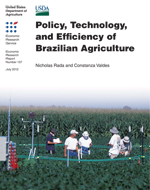Policy, Technology, and Efficiency of Brazilian Agriculture
- by Nicholas Rada and Constanza Valdes
- 7/9/2012
Overview
The Brazilian agricultural sector has been transformed from a traditional system of production with low use of modern technologies to a world agricultural leader. That transformation occurred as the country moved away from import-substitution policies—which nurtured domestic industrial development at the expense of agriculture—toward market-oriented policy reforms. These reforms included openness to foreign trade and foreign investment and the use of new technologies, which led to a new growth pattern. To evaluate that transformation, the authors use agricultural censuses spanning 1985-2006 to characterize Brazilian total factor productivity growth, decomposing that growth into technical and efficiency changes. This report presents the findings of a study that focuses on the effect of Brazil's science and technology investments and other public policies on farm production. The findings indicate that agricultural research benefits have been most rapidly adopted by the most efficient farms, widening the productivity gap between these farms and average farms. That gap, however, has been narrowed through other public policies, such as rural credit and infrastructure investments, that favor average producers.
Download
-
Entire report
Download PDF -
Report summary
Download PDF -
Download ERR137.zip
Download ZIP

